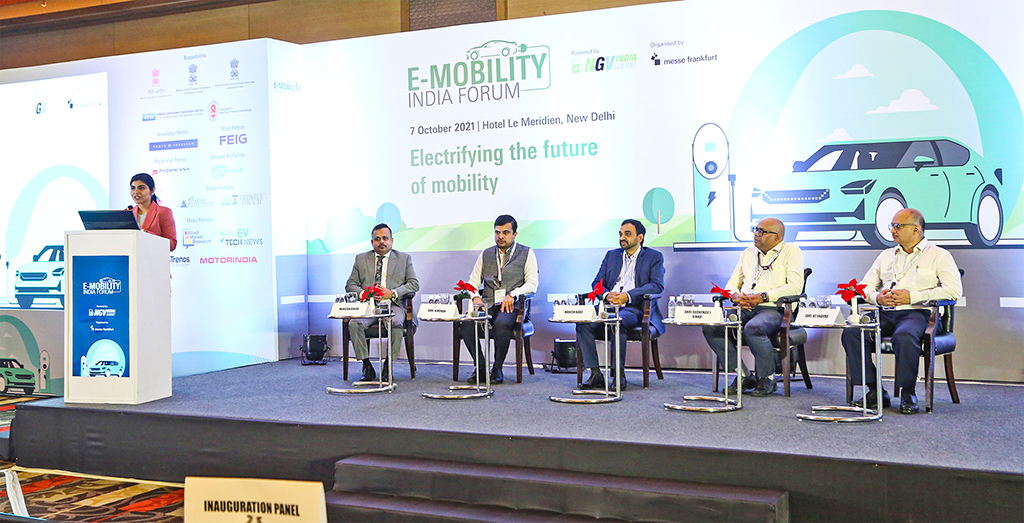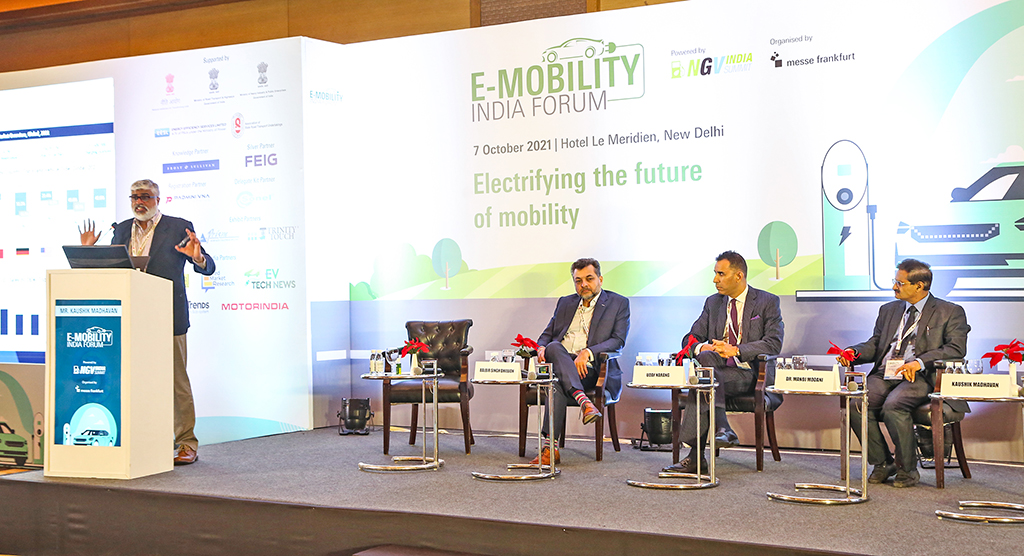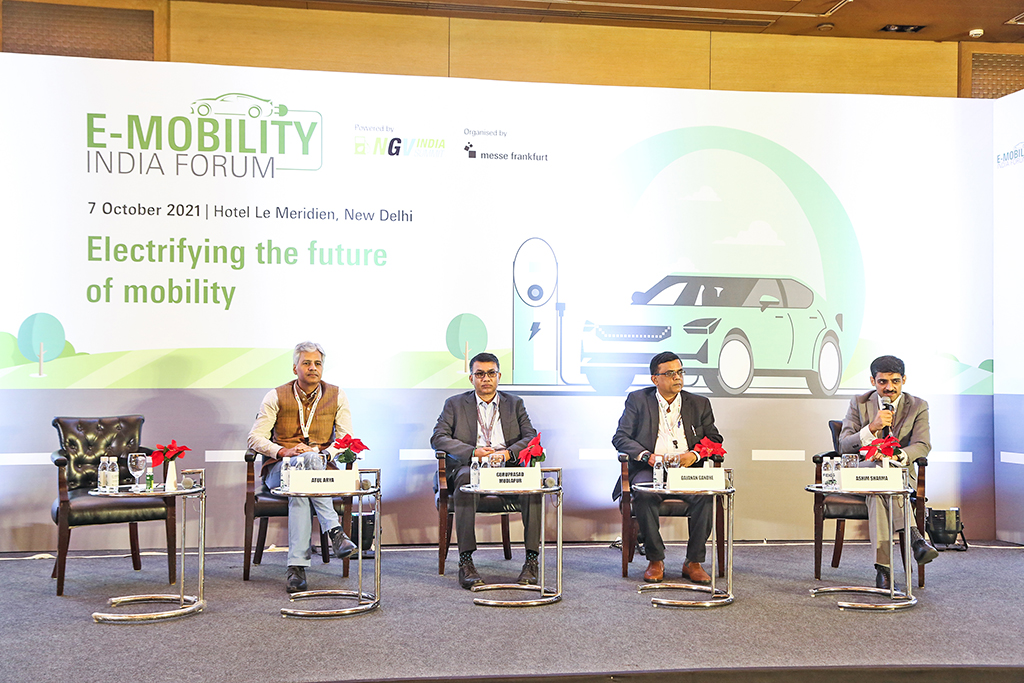
The conference themed ‘Electrifying the Future of Indian Mobility’ attracted many key stakeholders from the EV industry and was a welcome return to physical events after two waves of COVID

Launched by Messe Frankfurt India, the E-Mobility India Forum, powered by NGV India Summit, succeeded in bringing the industry face-to-face to discuss the way forward for electric vehicles (EVs). Consisting of members from top OEMs, automotive component manufacturers and the government, the forum highlighted various hurdles and opportunities that the industry is set to encounter on the road to achieving an expansive EV ecosystem. The launch edition of E-Mobility India Forum turned out to be a productive event for the industry that converged together to gain an elaborate understanding of the business dynamics and possibilities concerning the Indian EV industry.
Held on October 7, at Le Meridien, New Delhi, the conference united a wide spectrum of industry experts, inclusive of EV brand leaders and luminaries from major OEMs, automotive component, power and government sectors.

The forum was inaugurated by eminent industry figures, including:
• Mahesh Babu, CEO, Switch India and COO, Switch Global
• Sudhendu Sinha, Advisor, Infrastructure Connectivity and Electric Mobility Vertical, NITI Aayog
• K C Sharma, Superintending Engineer (Mechanical), Ministry of Road Transport and Highways
• N Mohan, Head – EV Charging Infrastructure, Convergence Energy Services Ltd.
• Winston Pereira, General Manager, Messe Frankfurt Trade Fairs India (P) Ltd.

Hosting 155 delegates under its roof, the E-Mobility India Forum delved into various fundamental topics pertaining to the Indian EV industry following a detailed agenda. The versatility of deliberations enabled the attendees to gain a deep-dive perspective on the contemporary and future landscape of the Indian EV space. The forum discussed topics such as the future of mobility post the conversion to EV; EV incentives, policy, challenges and government support in accelerating electrification; opportunities and challenges for automotive OEMs; accelerating EV component manufacturing growth through ‘Make in India’; EV infrastructure and innovative business models; and interactive session with EV start-ups and future guidance.

“What the Indian players need is not what is being done in the rest of the world but to bring out solutions which will enhance the life of the people in India! It is our responsibility to bring in the academia into the system, start working around teaching courses on EV and build knowledge. Only then we will be able to have a team ready to face the challenges during the electric transition,” said Mahesh Babu, CEO, Switch India and COO, Switch Global. “When it comes to the success of e-mobility in India, I think we are on the way to becoming a big market for EV. OEMs, policymakers or infrastructure companies converging together will help create a massive pull towards this movement and our responsibility as OEMs is to give charging facility to our customers. The road to e-mobility is a marathon and we are just getting started. I am sure that in the coming years we will see it moving in a very positive direction,” said Balbir Singh Dhillon, Head, Audi India.

Opportunities in EV
According to a Grant Thornton Bharat-FICCI report, India will require around 4 lakh charging stations for around 20 lakh electric vehicles in the country by 2026. Investment in infrastructure and government support will play a significant role in fast-pacing the growth of e-mobility in India. Sharing details about the current penetration level of EVs in India as well as the investments in EV infrastructure by the government, Sudhendu Sinha, Advisor, Infrastructure Connectivity and Electric Mobility Vertical, NITI Aayog, stated: “In India, electric two-wheelers and electric three-wheelers have already achieved neutral total cost of ownership and electric bus and shared electric four-wheelers will be next. Public transport, especially city transport with fixed routes and limited distance, is very much suited for EVs.”

“A massive opportunity is available to create a dense network of charge points to charge electric vehicles in Tier I, II and III cities. Recent policy announcements, re-strategising of Faster Adaption of Manufacturing of Electric Vehicles (FAME) scheme of Rs 10,000 crore, PLI scheme for Advanced Chemistry Cell (ACC) worth Rs 18,100 crore and the new PLI scheme for automotive sector with incentives worth Rs 26,000 crore for a period of five years will enable India to leapfrog from traditional fossil fuel-based automobile transportation system to environmentally cleaner, sustainable, advanced and more efficient EV-based system,” added Sinha.
“There is a whole new learning curve, a whole new start-up for everybody in this space. So I think it is an even playing field for everybody. A lot of us have to take leadership roles. We have to support and finance the new start-ups and encourage their innovations. There are more and more players and vehicles entering the space of electric mobility, an indication that the future is electric,” said Uday Narang, Founder and Chairman, Omega Seiki Mobility. Enthused by the success of its launch edition, the E-mobility India Forum aims to support India’s ambition of harnessing electric mobility by serving as a premiere networking and knowledge-sharing industry forum.